
How a Simple DIY Fix Saved My Weekend (And My Budget
There’s nothing quite like the satisfaction of fixing something yourself. Last weekend, I faced a plumbing issue that I couldn’t ignore. My kitchen sink leaked,
As parents, we all want our children to be healthy. But in a world full of germs and viruses, how can we ensure our little ones stay protected? 🤔 The answer might be simpler than you think–it’s right there on your plate! 🍽️
Boosting your child’s immune system doesn’t have to involve expensive supplements or complicated routines. In fact, nature has provided us with an array of delicious and nutritious foods that can help fortify your child’s defenses against illness. From vitamin C-packed citrus fruits to probiotic-rich yogurt, these immune-boosting superfoods are not only effective but also easy to incorporate into your family’s daily meals.
In this blog post, we’ll explore 10 healthy foods that can give your child’s immune system a natural boost. We’ll dive into the science behind each food’s immune-supporting properties and provide practical tips on how to include them in your child’s diet. Whether you’re dealing with a picky eater or looking for new, healthy meal ideas, you’ll find valuable insights to help keep your little one’s immune system in top shape. So, let’s embark on this nutritious journey and discover how to build a stronger, healthier future for your child – one bite at a time! 💪🍎

The immune system is a complex network of cells, tissues, and organs that work together to defend the body against harmful pathogens. In children, this system is still developing, making it crucial to support its growth and function.
White blood cells
Antibodies
Lymph nodes
Spleen
Thymus gland
These components work in harmony to identify and eliminate threats, creating a robust defense mechanism for your child’s health.
Children are often more susceptible to certain illnesses because of their developing immune systems. Understanding these common ailments can help parents take preventive measures and provide care.
| Illness | Symptoms | Prevention |
|---|---|---|
| Common cold | Runny nose, cough, sore throat | Hand washing, avoiding close contact |
| Ear infections | Ear pain, fever, irritability | Breastfeeding, avoiding secondhand smoke |
| Chickenpox | Itchy rash, fever, fatigue | Vaccination |
| Gastroenteritis | Diarrhea, vomiting, abdominal pain | Proper hygiene, safe food handling |
Proper nutrition plays a vital role in supporting and strengthening a child’s immune system. A balanced diet rich in essential nutrients can help boost immunity and reduce the risk of infections.
Key nutrients for immune health:
Vitamin C: Enhances white blood cell production
Vitamin D: Regulates immune responses
Zinc: Supports immune cell development
Protein: Builds and repairs immune tissues
Probiotics: Promote gut health and immune function
By incorporating a variety of nutrient-dense foods into your child’s diet, you can provide the building blocks necessary for a strong immune system. This foundation will help protect against common childhood illnesses and promote overall health and well-being.

Citrus fruits, particularly oranges and grapefruits, are exceptional sources of vitamin C, a powerful antioxidant that plays a crucial role in supporting your child’s immune system. These fruits not only boost immunity but also offer additional health benefits:
Vitamin C content
Fiber for digestive health
Hydration support
Antioxidants for overall wellness
| Nutrient | Orange (1 medium) | Grapefruit (1/2 medium) |
|---|---|---|
| Vitamin C | 70 mg | 88 mg |
| Fiber | 3 g | 2 g |
| Calories | 62 | 52 |
Make citrus fruits exciting for kids with these creative ideas:
Frozen orange slices as a refreshing snack
Citrus-infused water for a flavorful drink
Grapefruit brûlée for a special breakfast treat
Orange zest in pancakes or muffins
Citrus salsa as a topping for grilled chicken or fish
The recommended daily intake of vitamin C varies by age:
1-3 years: 15 mg
4-8 years: 25 mg
9-13 years: 45 mg
14-18 years: 65-75 mg
One medium orange or half a grapefruit can easily meet these requirements. However, it’s important to balance citrus intake with other nutrient-rich foods for a well-rounded diet. Now that we’ve explored the benefits of citrus fruits, let’s move on to another powerful immune-boosting food: yogurt.
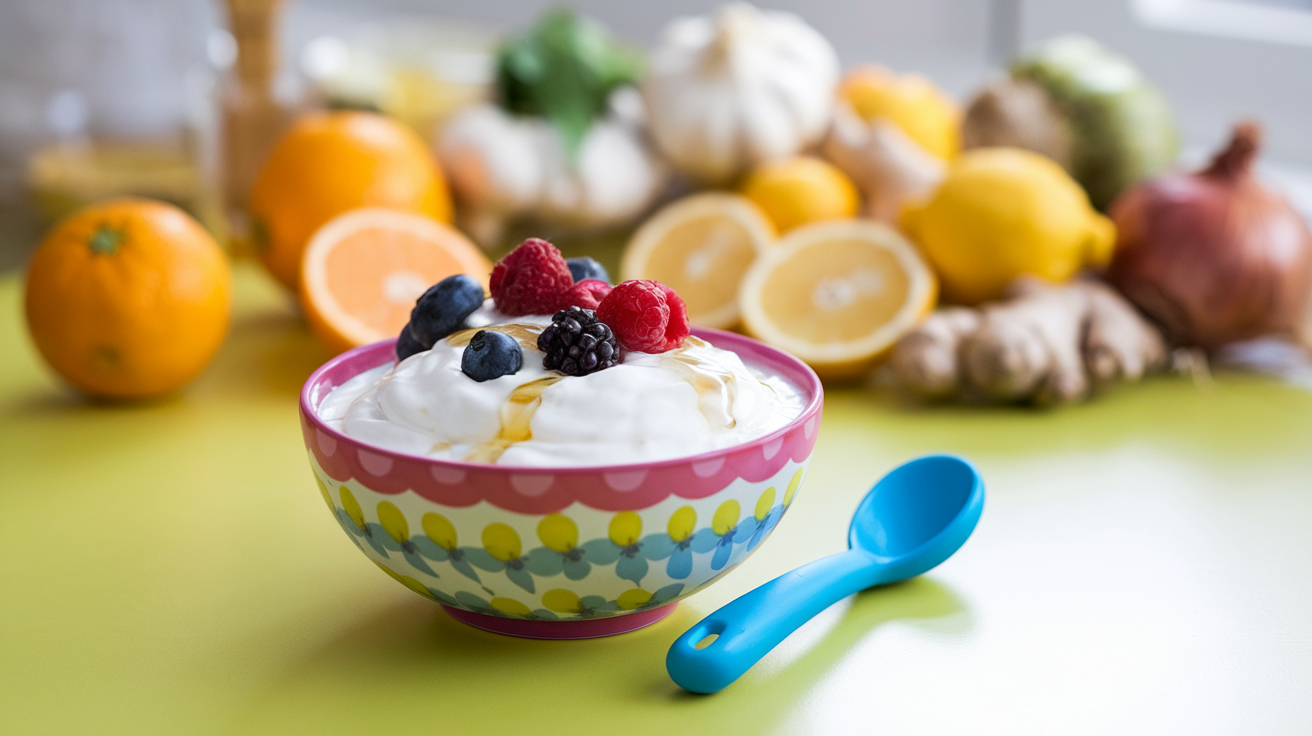
Probiotics, the beneficial bacteria found in yogurt, play a crucial role in supporting your child’s immune system. These friendly microorganisms help maintain a healthy balance in the gut, which is where a significant portion of the immune system lives. By promoting good digestive health, probiotics contribute to:
Improved nutrient absorption
Enhanced barrier function against harmful pathogens
Reduced risk of gastrointestinal infections
Decreased inflammation in the body
When selecting yogurt for your child, consider the following factors:
| Factor | Recommendation |
|---|---|
| Sugar content | Choose low-sugar or unsweetened options |
| Probiotic strains | Look for varieties with multiple strains |
| Fat content | Opt for full-fat yogurt for younger children |
| Artificial additives | Avoid yogurts with artificial colors or flavors |
Incorporate probiotic-rich yogurt into your child’s diet with these fun and nutritious ideas:
Yogurt parfaits with fresh berries and granola
Frozen yogurt popsicles with pureed fruit
Creamy yogurt dips for vegetable sticks
Smoothie bowls topped with nuts and seeds
Yogurt-based fruit salad dressings
By making yogurt a regular part of your child’s diet, you’re providing them with a delicious and effective immune-boosting food. Next, we’ll explore another antioxidant-packed superfood that can further strengthen your child’s immune defenses.
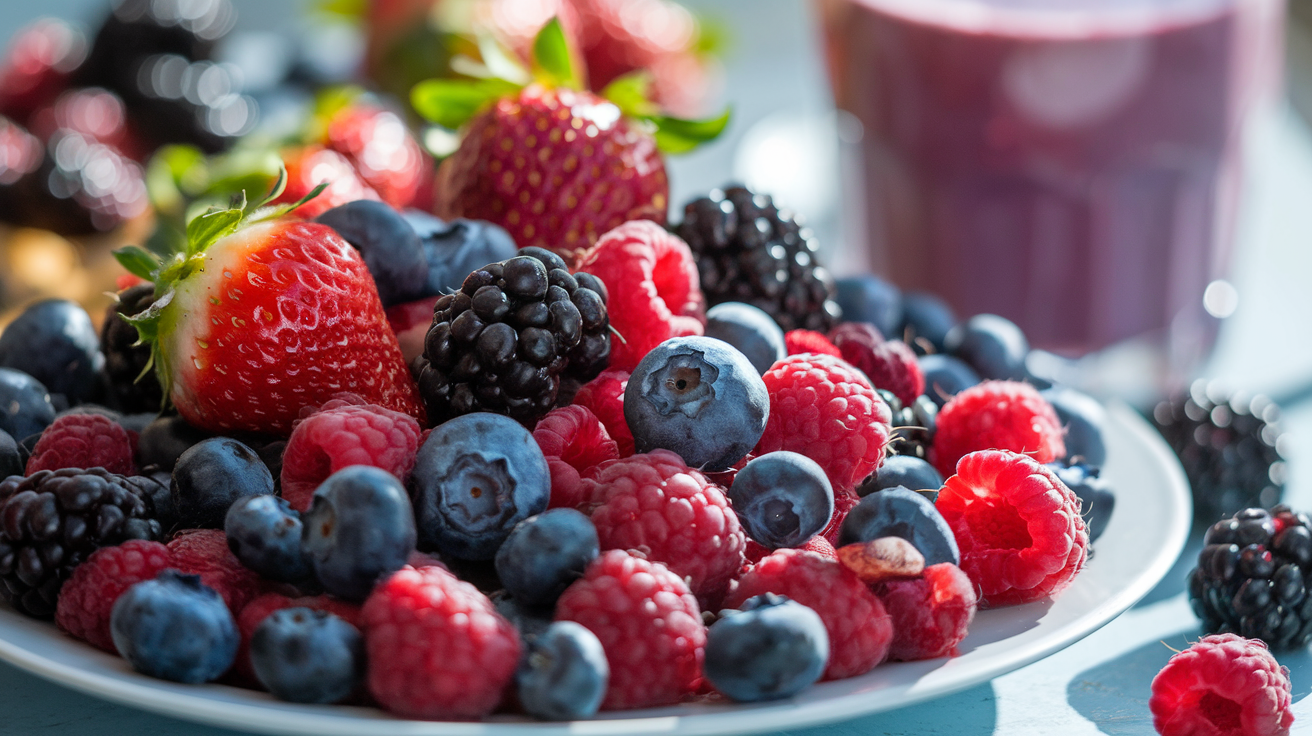
Berries are nature’s colorful candies, packed with immune-boosting goodness. Strawberries, blueberries, and raspberries are not only delicious but also powerful allies in supporting your child’s immune system. These tiny fruits are bursting with essential vitamins and minerals that help protect against illnesses.
| Berry Type | Key Nutrients | Immune Benefits |
|---|---|---|
| Strawberries | Vitamin C, Folate | Enhances white blood cell production |
| Blueberries | Anthocyanins, Vitamin C | Reduces inflammation, fights oxidative stress |
| Raspberries | Vitamin C, Manganese | Supports overall immune function |
The secret weapon in berries is their high antioxidant content. These powerful compounds help neutralize harmful free radicals in the body, reducing inflammation and supporting overall immune function. Antioxidants like flavonoids and ellagic acid found in berries can be :
Strengthen the immune system’s response to infections
Protect cells from damage
Reduce the risk of chronic diseases
Incorporating berries into your child’s diet can be fun and delicious. Try these simple ideas:
Berry smoothie bowls topped with granola
Yogurt parfaits layered with mixed berries
Homemade berry popsicles for a refreshing treat
Berry-infused water for a flavorful twist on hydration
By including a variety of berries in your child’s meals, you’re providing a tasty and effective way to boost their immune system naturally. Next, we’ll explore how leafy greens contribute to a strong immune defense in children.
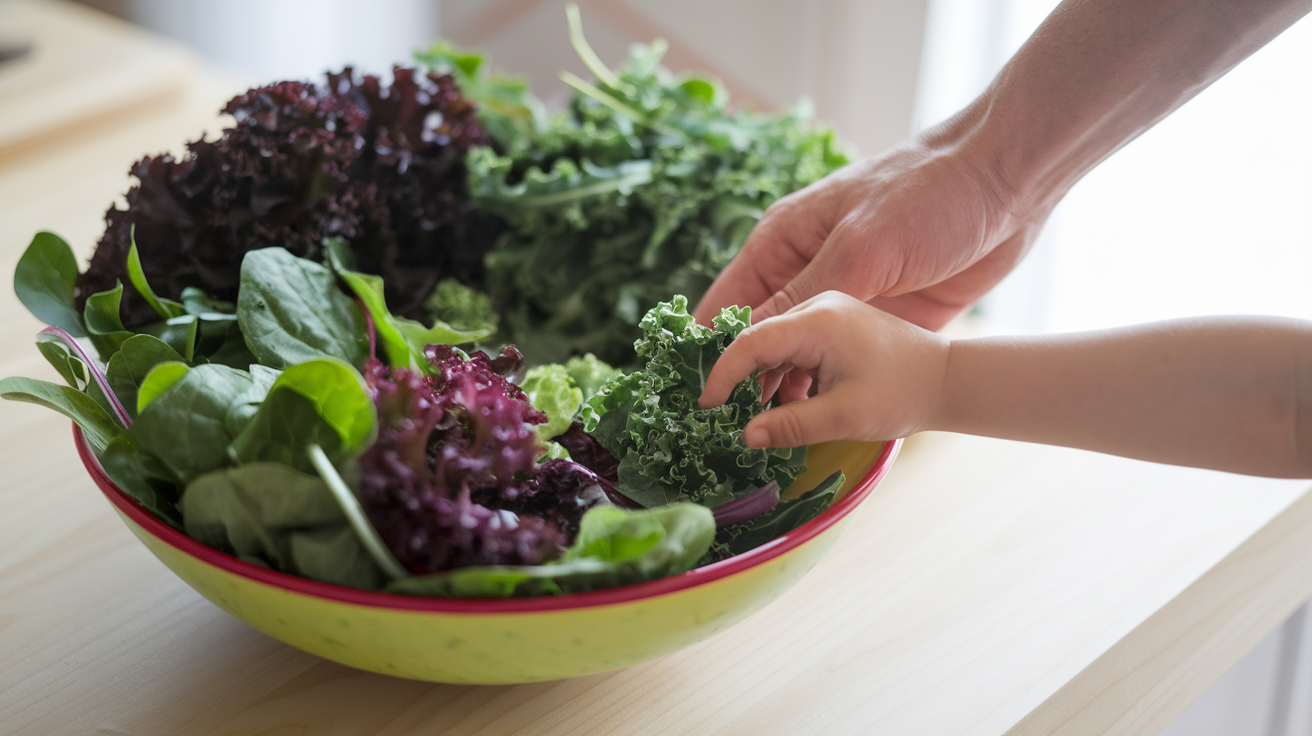
Leafy greens like spinach, kale, and Swiss chard are nutritional powerhouses that play a crucial role in supporting your child’s immune system. These greens contain essential vitamins, minerals, and antioxidants that help protect against infections and boost overall health.
| Leafy Green | Key Nutrients | Immune-Boosting Benefits |
|---|---|---|
| Spinach | Vitamin C, Iron, Folate | Enhances white blood cell production |
| Kale | Vitamin A, Vitamin K, Antioxidants | Strengthens skin barrier, reduces inflammation |
| Swiss Chard | Vitamin E, Magnesium, Potassium | Supports cellular health, regulates immune response |
Getting children to eat leafy greens can be challenging, but with a little creativity, you can incorporate these nutrient-dense foods into their meals:
Blend greens into smoothies with fruits
Add finely chopped greens to pasta sauces
Make green pesto for sandwiches or pasta
Bake kale chips as a crunchy snack
Mix greens into homemade meatballs or burgers
To ensure your child gets the immune-boosting benefits of leafy greens without overwhelming their plate, follow these age-appropriate serving guidelines:
Toddlers (1-3 years): 1/4 to 1/2 cup cooked greens
Preschoolers (4-5 years): 1/2 to 3/4 cup cooked greens
School-age children (6-12 years): 1 to 1 1/2 cups cooked greens
Remember to introduce greens gradually and pair them with foods your child already enjoys. With consistent exposure and positive associations, leafy greens can become a regular part of your child’s immune-boosting diet.
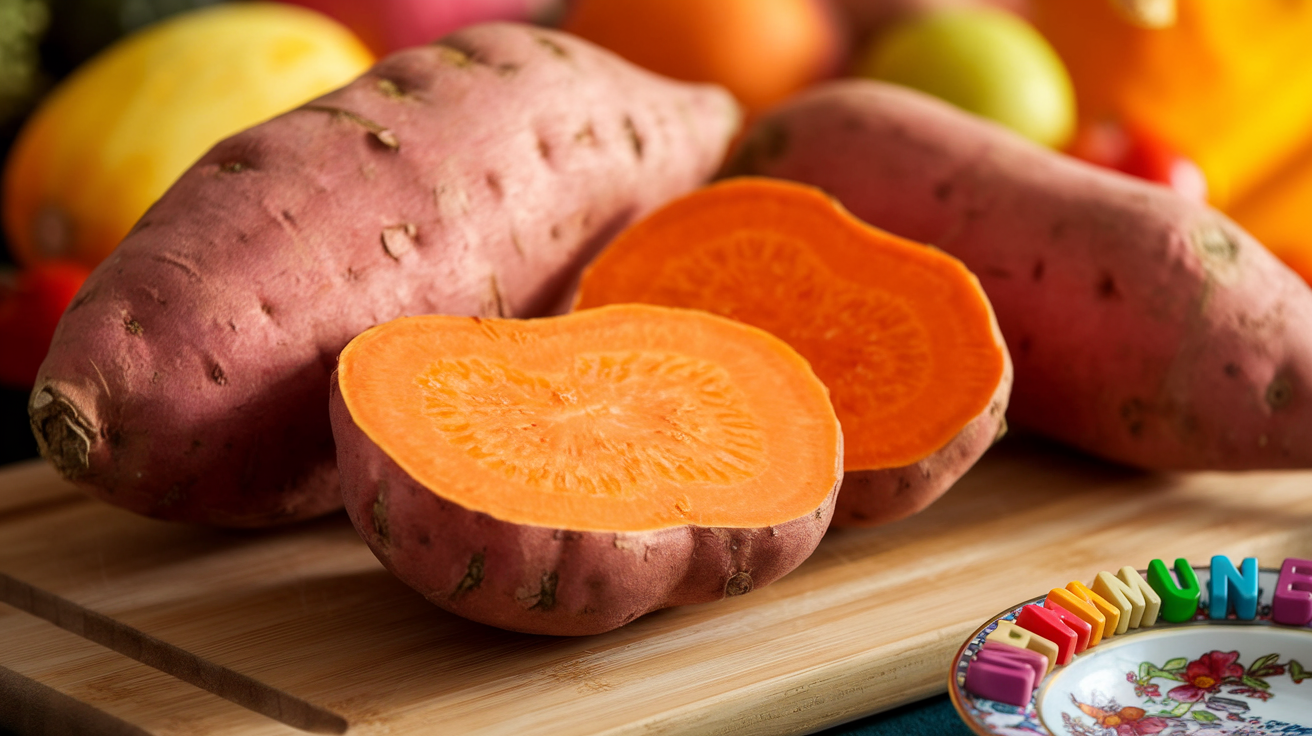
Sweet potatoes are nutritional powerhouses, packed with essential vitamins and minerals that support your child’s immune system. Here’s a breakdown of their impressive nutritional profile:
| Nutrient | Amount per 100g |
|---|---|
| Beta-carotene | 13,120 mcg |
| Vitamin C | 2.4 mg |
| Vitamin B6 | 0.2 mg |
| Fiber | 3 g |
| Potassium | 337 mg |
Beta-carotene, the compound responsible for sweet potatoes’ vibrant orange color, plays a crucial role in boosting your child’s immune system. When consumed, the body converts beta-carotene into vitamin A, which:
Enhances the production of white blood cells
Supports the health of mucous membranes
Acts as a powerful antioxidant, protecting cells from damage
These functions combine to create a robust defense against infections and illnesses, making sweet potatoes an excellent immune-boosting food for kids.
Incorporating sweet potatoes into your child’s diet can be both fun and delicious. Try these immune-strengthening recipes:
Sweet potato fries: Cut into strips, toss with olive oil, and bake for a healthier alternative to regular fries
Mashed sweet potatoes: Add a touch of cinnamon for a naturally sweet treat
Sweet potato pancakes: Mix mashed sweet potatoes into your regular pancake batter for a nutritious breakfast
Now that we’ve explored the immune-boosting benefits of sweet potatoes, let’s move on to another protein-rich food that supports your child’s immune system.
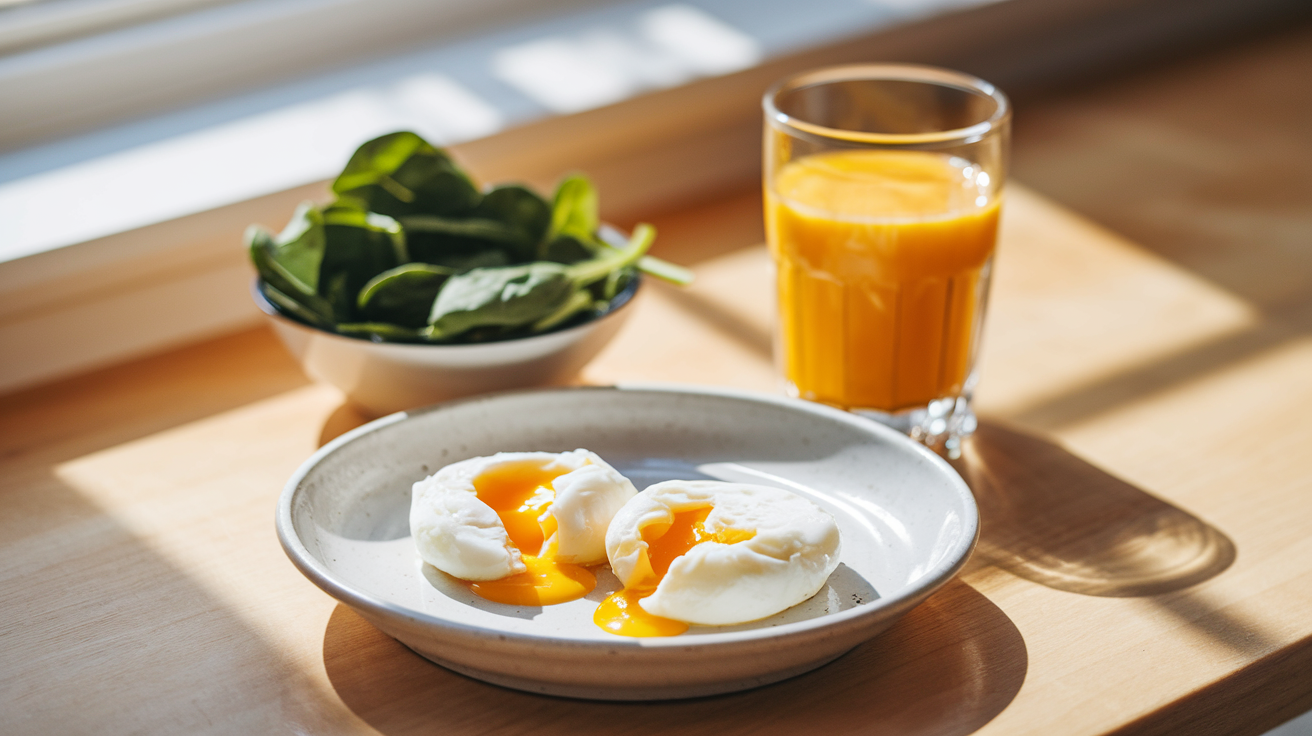
Eggs are a nutritional powerhouse, packed with essential nutrients that support your child’s immune system. Here’s a breakdown of the key nutrients found in eggs:
| Nutrient | Benefits for Immunity |
|---|---|
| Protein | Builds antibodies and immune cells |
| Vitamin D | Regulates immune function |
| Selenium | Acts as an antioxidant |
| Zinc | Supports immune cell development |
| Vitamin B12 | Enhances white blood cell production |
Vitamin D plays a crucial role in boosting your child’s immune system. This essential nutrient:
Activates immune cells
Reduces inflammation
Enhances the body’s ability to fight infections
With many children spending fewer time outdoors, eggs serve as an excellent dietary source of vitamin D, helping to fill potential nutritional gaps.
Incorporating eggs into your child’s diet can be fun and delicious. Try these kid-friendly ideas:
Mini egg muffins with vegetables
Scrambled egg and cheese quesadillas
Egg and banana pancakes
Colorful egg and veggie wraps
French toast sticks with fruit dip
These nutrient-rich options not only support your child’s immune system but also provide a tasty start to the day. By including eggs in your child’s diet, you’re providing them with a natural immune booster that’s both versatile and delicious.
Now that we’ve explored the immune-boosting benefits of eggs, let’s move on to another excellent source of nutrients for your child’s immune system: nuts and seeds.
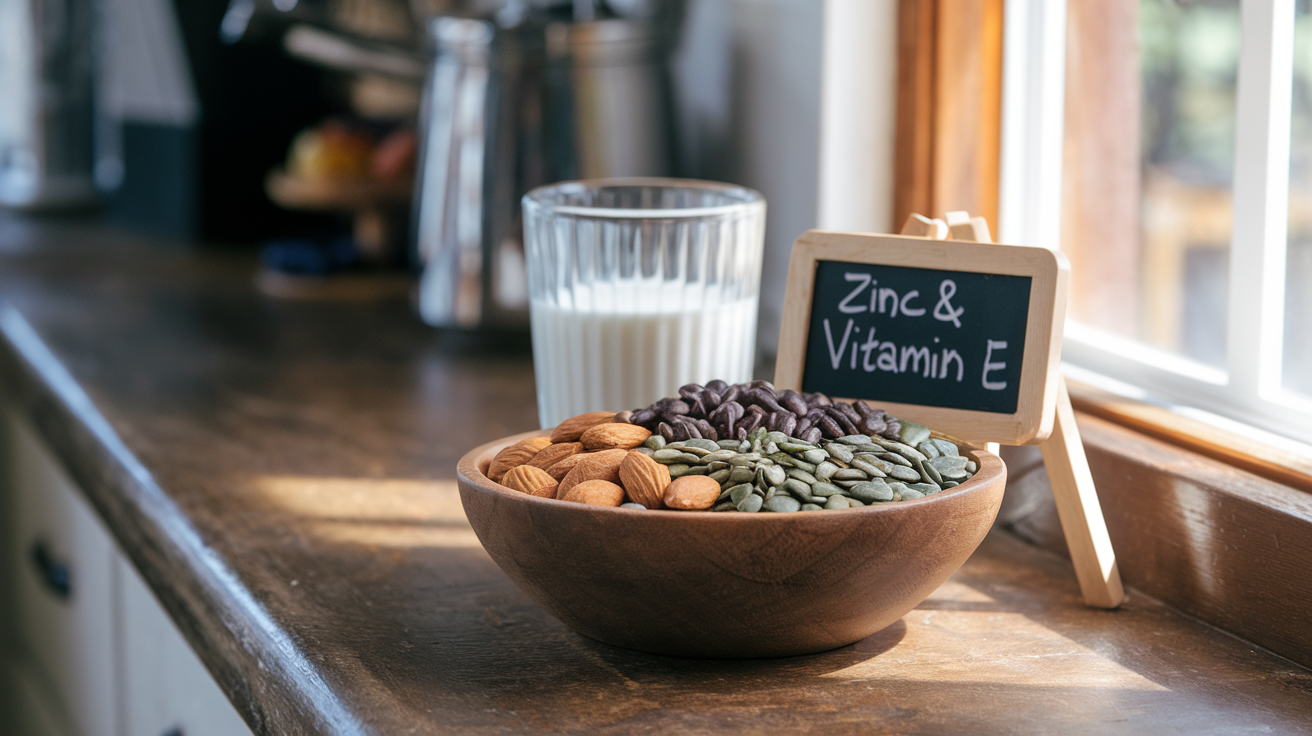
Nuts and seeds are nutritional powerhouses that can significantly boost your child’s immune system. Almonds, sunflower seeds, and pumpkin seeds are beneficial due to their high zinc and vitamin E content. Here’s a quick comparison of their nutritional profiles:
| Nutrient | Almonds (1 oz) | Sunflower Seeds (1 oz) | Pumpkin Seeds (1 oz) |
|---|---|---|---|
| Zinc | 0.9 mg | 1.5 mg | 2.2 mg |
| Vitamin E | 7.3 mg | 7.4 mg | 0.2 mg |
| Protein | 6 g | 5.5 g | 7 g |
Zinc and vitamin E play crucial roles in supporting your child’s immune system.
Zinc:
Aids in the production and function of immune cells
Supports wound healing
Acts as an antioxidant, protecting cells from damage
Vitamin E:
Enhances T-cell function, a key component of the immune system
Protects cell membranes from oxidative stress
Supports the production of antibodies
When introducing nuts and seeds to your child’s diet, consider these safety tips:
Start with nut butters or finely ground seeds for younger children
Introduce one new food at a time to monitor for allergies
Avoid whole nuts for children under 4 to prevent choking hazards
Opt for unsalted varieties to control sodium intake
Incorporate nuts and seeds into familiar foods, such as smoothies or yogurt
By gradually incorporating these nutrient-rich foods into your child’s diet, you can help strengthen their immune system naturally. Remember to consult with your pediatrician before changing your child’s diet, especially if there’s a history of allergies in the family.

Lean meats like chicken, turkey, and lean beef play a crucial role in supporting your child’s immune system. These protein-rich foods offer essential nutrients that help build and maintain a strong immune defense. Let’s explore the unique benefits of each:
| Meat Type | Key Benefits |
|---|---|
| Chicken | High in protein, low in fat, rich in B vitamins |
| Turkey | Lean protein source, contains selenium and zinc |
| Lean Beef | Excellent source of iron, zinc, and B vitamins |
Iron is a vital nutrient for immune function, and lean meats are excellent sources of this mineral. Here’s how iron supports your child’s immune system:
Helps produce hemoglobin, which carries oxygen to immune cells
Supports the proliferation and maturation of immune cells
Enhances the body’s ability to fight off infections
Making lean meats appealing to children can be a challenge, but here are some kid-friendly preparation ideas:
Mini meatballs: Mix ground turkey or lean beef with grated vegetables
Chicken strips: Bake breaded chicken tenders for a healthier alternative to fried options
Stir-fry: Combine colorful vegetables with bite-sized pieces of chicken or lean beef
Kebabs: Thread cubes of meat and vegetables onto skewers for a fun, interactive meal
By incorporating these lean meats into your child’s diet, you’ll be providing them with essential nutrients that support a robust immune system. Next, we’ll explore practical ways to incorporate these and other immune-boosting foods into your child’s daily meals.
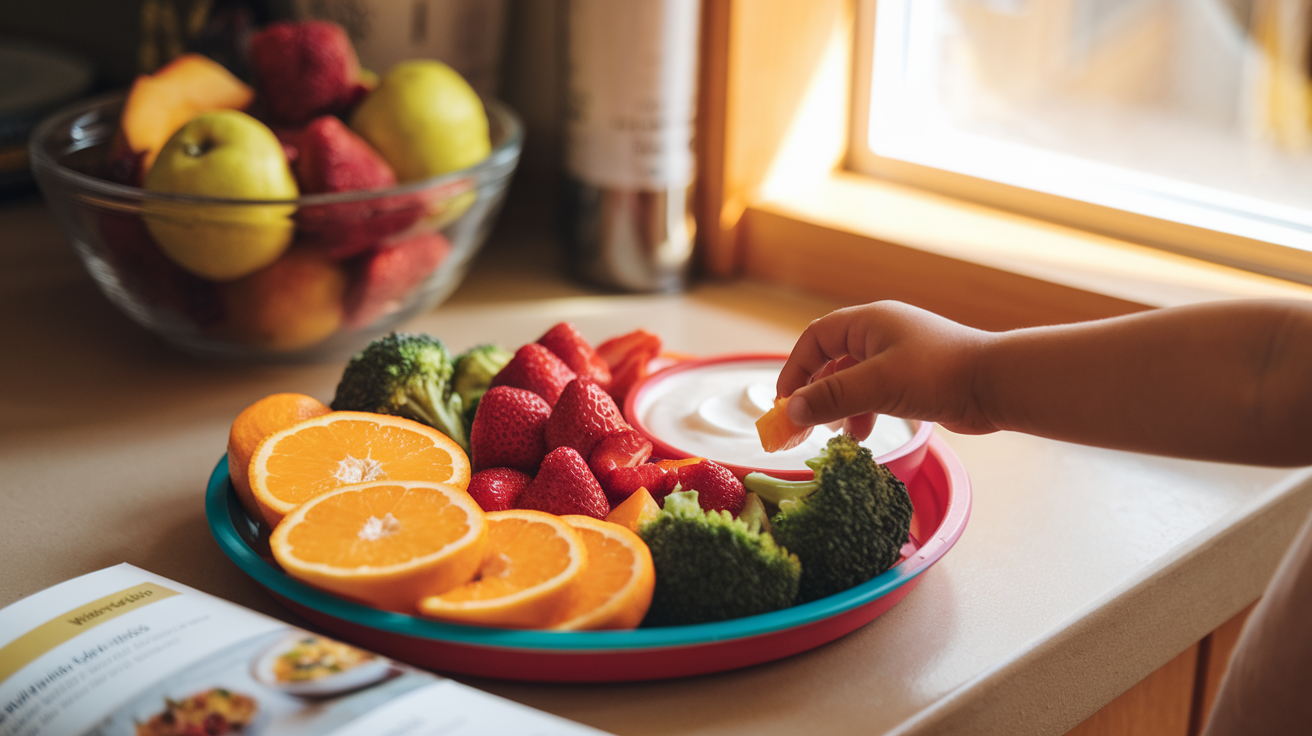
For incorporating immune-boosting foods into your child’s diet, balanced meal planning is key. Aim to include a variety of colorful fruits and vegetables, lean proteins, whole grains, and healthy fats in each meal. Here’s a simple guide to help you create balanced plates:
| Food Group | Portion Size | Examples |
|---|---|---|
| Fruits/Vegetables | 1/2 plate | Berries, citrus, leafy greens, sweet potatoes |
| Proteins | 1/4 plate | Eggs, lean meats, yogurt, nuts |
| Whole Grains | 1/4 plate | Brown rice, whole wheat bread, quinoa |
| Healthy Fats | Small amount | Avocado, olive oil, seeds |
Picky eaters:
Offer new foods alongside familiar ones
Involve kids in meal preparation
Be patient and persistent
Busy schedules:
Prep meals in advance
Keep healthy snacks readily available
Opt for quick, nutritious options like smoothies
Create colorful and visually appealing plates
Use cookie cutters to make fun shapes
Give foods playful names like “immunity power balls” for energy bites
Involve children in grocery shopping and meal planning
By implementing these strategies, you can ensure your child receives a variety of immune-boosting foods throughout the day. Remember, consistency is key in supporting your child’s immune system through nutrition.

A strong immune system is crucial for your child’s health and well-being. By incorporating these ten nutritious foods into your child’s diet, you can significantly boost their immune defenses. From vitamin C-rich citrus fruits to probiotic-packed yogurt, antioxidant-loaded berries, and nutrient-dense leafy greens, each food plays a vital role in supporting your child’s immune system.
Remember, consistency is key for nutrition. Aim to include a variety of these immune-boosting foods in your child’s daily meals and snacks. By doing so, you’re not only protecting their health but also instilling healthy eating habits that will benefit them for years to come. Start small, be creative with recipes, and watch as your child’s immune system grows stronger with every nutritious bite.
Share this article:
– read more –

There’s nothing quite like the satisfaction of fixing something yourself. Last weekend, I faced a plumbing issue that I couldn’t ignore. My kitchen sink leaked,

Owning a car comes with its own set of responsibilities. Regular maintenance can prevent costly repairs down the line, and knowing how to handle minor

Homeownership comes with its fair share of maintenance and repair tasks. While some repairs are best left to professionals, there are plenty of simple fixes

As a homeowner, taking on small repairs around the house can seem intimidating, especially if you’ve never done them before. However, with the right mindset,

As a homeowner, it’s important to have a basic understanding of home repairs. Whether you want to save money on costly service calls or simply

Homeownership comes with a lot of responsibilities—chief among them, maintaining and repairing your property. While calling in a professional may seem like the easiest solution